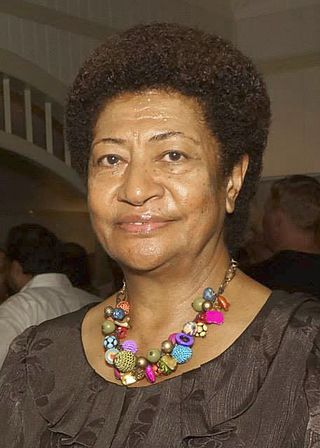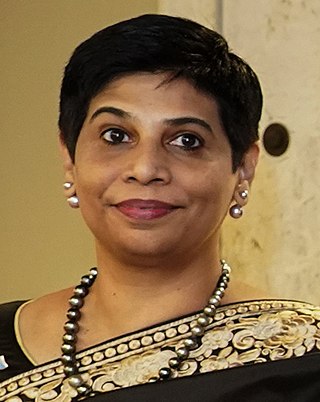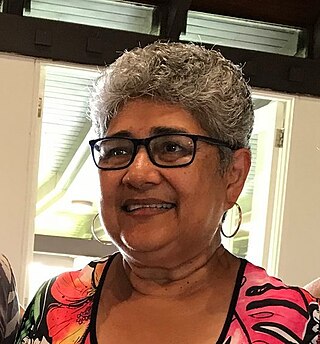
Josaia Voreqe "Frank" Bainimarama is a Fijian former politician and naval officer who served as the prime minister of Fiji from 2007 until 2022. A member of the FijiFirst party, which he founded in 2014, he began his career as an officer in the Fijian navy and commander of the Fijian military. Despite being suspended from Parliament, he served as the opposition leader from 24 December 2022 until 8 March 2023, when he resigned and was replaced by Inia Seruiratu.
Ratu Jope Naucabalavu Seniloli was a Fijian chief who held the title of Turaga Taukei Naua and who served as Fiji's vice-president from 25 March 2001 to 29 November 2004, when he was forced to resign following his conviction for treason on 6 August 2004, and the rejection of his appeal early in November.
Taniela (Daniel) Vafo'ou Fatiaki CF was the Chief Justice of Fiji from 1 August 2002, when he succeeded Sir Timoci Tuivaga, till 5 December 2008. As Chief Justice, he presided over both the High Court and the Supreme Court, but was constitutionally barred from presiding over, or even sitting on, the Appeal Court. On 3 January 2007, he was sent on leave by the Republic of Fiji Military Forces, which had seized power on 5 December 2006. On 19 January, he was formally suspended, pending an investigation into allegations of misconduct. This investigation was dropped in December 2008 as part of a deal that involved his formal resignation.

RoTeimumu Vuikaba Kepa is a Fijian chief, former Member of the Parliament of Fiji, and former leader of the Social Democratic Liberal Party. She was the first Fijian woman to serve as Leader of the Opposition. She previously held the position of Deputy Prime Minister in the Qarase-led Soqosoqo Duavata ni Lewenivanua (SDL) government from 2001 to 2006. As the paramount chief of the Burebasaga Confederacy, she holds the title Roko Tui Dreketi.

In the early 2000s, Prime Minister Laisenia Qarase's government proposed legislation to establish a Commission with the power, subject to presidential approval, to pardon perpetrators and compensate victims of the coup d'état against the elected government of Mahendra Chaudhry in 2000. Most Fijian politicians outside of the government came out against proposed legislation Along with many politicians, the Military and a number of business and professional organizations also came out against the bill. The campaign derived its name from the yellow ribbons promoted by the opposition United Peoples Party and worn by many citizens, as a sign of their opposition to the legislation.
Kenneth Vincent Zinck is a former Fijian trade unionist, politician and Cabinet Minister, who served as Minister of Labour in the government of Laisenia Qarase from 2001 to 2006. In the aftermath of the 2006 Fijian coup d'état he sought political asylum in Australia.

General elections were held in Fiji between 6 and 13 May 2006.

The controversial Reconciliation, Tolerance, and Unity Bill promoted by the Fijian government throughout 2005 generated enormous debate, both locally and internationally. The legislation aimed to establish a Commission empowered to compensate victims and pardon perpetrators of the coup d'état that deposed the elected government of Prime Minister Mahendra Chaudhry in May 2000. Support for the legislation came from Japan, while New Zealand opposed it. Australia, too, expressed strong reservations about the legislation, but also called on opponents of it, including the Military of Fiji, to show greater moderation. Non-governmental organizations in a number of countries took positions, also.

The Reconciliation and Unity Commission was a proposed government body to be set up if the Reconciliation, Tolerance, and Unity Bill, which was introduced into the Fijian Parliament on 4 May 2005 was passed. The legislation proposed to empower the commission to grant amnesty to perpetrators of the Fiji coup of 2000, and compensation to victims of it from 19 May 2000 through 15 March 2001. The Fijian President would retain a veto over the granting of amnesty.
The Fiji Law Society is the official body that registers and regulates the activity of all lawyers in Fiji. Historically, the President of the Fiji Law Society was a member ex officio of the Judicial Service Commission.

The Fijian coup d'état of December 2006 was a coup d'état in Fiji carried out by Commodore Frank Bainimarama against Prime Minister Laisenia Qarase and President Josefa Iloilo. It was the culmination of a political crisis that had begun the previous year when the Qarase government introduced three bills to the Fijian Parliament. The Qoliqoli, Land Tribunal, and Reconciliation, Tolerance, and Unity Bills dealt with the ongoing ethnic conflicts in Fiji and the aftermath of the 2000 coup, and were considered to be pro-ethnic Fijian. Bainimarama, the Commander of the Republic of Fiji Military Forces (RFMF), presented the government with a list of demands on October 16 that included withdrawing the bills. Attempts at negotiation failed and the military launched a coup on 4 December. Parliament was dissolved, Qarase and his cabinet were dismissed, and some civilian officials were placed under house arrest. After the Great Council of Chiefs refused to appoint a cabinet friendly to the military, Bainimarama reached an understanding with Iloilo and reinstated him as President on 4 January 2007. Iloilo then appointed Bainimarama acting Prime Minister in charge of the Interim Cabinet.

Richard Naidu is an Indo-Fijian journalist, constitutional lawyer and opponent of the 2006 Fijian coup d'état. He is a former director of Transparency International Fiji.

Nazhat Shameem Khan is a Fijian diplomat and former judge who served as the Permanent Representative of Fiji to the United Nations from 2014 to 2022. She was also the President of the United Nations Human Rights Council in 2021. She served as a judge of the High Court of Fiji from 1999 to 2009, the first woman to do so. She is currently a Deputy Prosecutor for the International Criminal Court.
The Fiji Human Rights Commission (FHRC) was created by presidential decree in 2009, succeeding the entity of the same name established as an independent statutory body under the 1997 Constitution of the Republic of the Fiji Islands.

Shamima Ali is a Fijian political activist of Indian descent. As of July 2015, she is the Coordinator of the Fiji Women's Crisis Centre (FWCC), a post she has held for many years. She has also been a member of the Fiji Human Rights Commission (FHRC).
Rodney Acraman was Fiji's Acting Ombudsman and thus the ex officio Chairperson of the Fiji Human Rights Commission from 2006 to 2007, when he was replaced by Shaista Shameem. The Military administration, which took power in a coup d'état on 5 December 2006, appointed him to the Ombudsman's position on 13 December. Prior to his appointment, Acraman had worked for sixteen years in the Ombudsman's office. The position had been vacant since Walter Rigamoto had resigned earlier in the year to resume his private law practice.
Angenette (Angie) Heffernan is a Fijian human rights and democracy activist and executive director of the Pacific Centre for Public Integrity (PCPI). Prior to PCPI she was a prominent regional environmental political campaigner for Greenpeace Australia for eight years, during which she campaigned against Japanese plutonium shipments in the South Pacific. She established the Pacific Centre for Public Integrity with Suliana Siwatibau and social justice campaigner Aisake Casimira to combat perceived corruption and bad governance in the Pacific region, She is known for her strong stance against political and state corruption and for her outspoken opposition to the 2006 Fijian coup d'état.

Fiji is an island nation in Melanesia in the South Pacific Ocean with a population of approximately 849,000. It is made up of Fijians, Indo-Fijians, Europeans, Chinese, other Pacific islanders, and people of mixed racial descent. Fiji has been in a state of political unrest since their independence from Britain in 1970.
The Essential National Industries (Employment) Decree 2011 is a controversial decree issued by the military-led 'interim government' of the Republic of Fiji in September 2011. It was followed a few days later by the Essential National Industries and Designated Corporations Regulations 2011.







